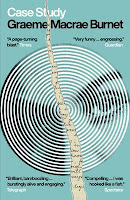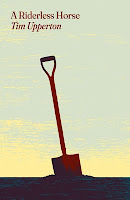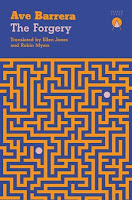NEW RELEASES
The Wall by Marlen Haushofer (translated by Shaun Whiteside) $40
A woman goes to the Austrian mountains to spend a few days in a hunting lodge with her cousin and his wife. When the couple fail to return from a walk, the woman tries to go into the village to look for them. Instead she comes across a transparent wall behind which there seems to be no life. Trapped behind the wall, a result of a too successful military experiment, she begins the arduous work of not only survival but self-renewal. The Wall is at once a simple document of potatoes and beans, of hoping for a calf, of counting matches, of forgetting the taste of sugar and the use of one's name, and simultaneously a disturbing meditation on our place in the natural world.
"The Wall is a novel that contrives to be, by turns, utopian and dystopian, an idyll and a nightmare. In her isolation behind the wall, together with her animals, the woman discovers a new life, in comparison with which her existence before she came to the mountains seems trivial and pointless. The natural world which it describes with such rapt attention is cupped in the larger receptacle of a vivid and sinister dream, a dream we seem to have had many times before and which on each retelling leads to the same scene of horror at its climax." —Nicholas Spice, London Review of Books
"It is about our reasons for living, self-sufficiency, solitude, men, women, war, and love, and the problem of other minds. And the animals in this book-oh! I don't understand why this book is not considered one of the most important books of the twentieth century. I have been anxiously pushing it on everyone I know, and now I push it on you." —Sheila Heti, The Paris Review
>>Claire Louise Bennett on The Wall.
>>Read Thomas's review.

Over the course of a night in police custody, a young woman tries to understand the rage that led her to assault a refugee on the Paris metro. She too is a foreigner, now earning a living as an interpreter for asylum seekers in the outskirts of the city. Translating the stories of men and women who come from her country of birth, into the language of her country of citizenship, Sinha’s narrator finds herself caught up in a tangle of lies and truths.
"A provocative and visceral book about class, caste, fear and self-loathing, exposing the real generational damage Imperialism wreaks on brown minds. Shumona Sinha gets inside the skin of an everyday woman turned monster by the system: her voice grips the imagination and does not let go." —Preti Taneja
Jumping Sundays: The rise and fall of the counterculture in Aotearoa New Zealand by Nick Bollinger $50
What transformation was wrought upon society by the counterculture movements of the 1960s and 1970s? Bollinger tells the story of beards and bombs, freaks and firebrands, self-destruction and self-realisation, during a turbulent period.
"A compelling and important history of the counterculture in Aotearoa New Zealand. Meticulously researched and full of vivid details and memorable photographs, this book is an immensely readable and absorbing account of an important era in our recent history." —Sue Kedgley
"Jumping Sundays is a fluent, vivid, coherent and succinct account of a period of turmoil during which major changes took place in New Zealand society, and of the ways we understood what that society was, what it had been, and what it could yet become." —Martin Edmond
"An absorbing and serious account that is also terrific fun. Deft interviews and personal letters provide rollicking recollections together with many amazing new photographs and images. Bollinger puts a personal and personable stamp on this critical decade with words, sights and sounds that surprise and delight." —Bronwyn Labrum
>>
The liberation of Albert Park.
by Jesse Ball $48
Taking as its model Édouard Levé's
Autoportrait, and written in a single day, Jesse Ball's book is a remarkable memoir in which the important and unimportant details of his life are shown to be equally revelatory not only of the thinking and experiences of one of America's most interesting and nuanced writers, but of life itself (so to call it). How does memory work? What do we think is important to us? Why do we spend so much time and effort on other things? Ball brings focus,, insight and humane curiosity to the circumstances of being alive.
"The pleasure, here, is in errancy and velocity. Ball's text leans into cold wonder, flirting with a Francis Ponge-like poetry of the mundane and highlighting his predilection for the absurd, the diffuse, the simply odd. Much of the strange delight of reading this book is found in teasing out the precise nature of Ball's writerly persona, variously warm and cold, aloof and sincere." —Bailey Trela, Frieze
"Both Ball and Levé are working in a tradition that falls under the rubric of 'life writing,' encompassing both memoir and the stranger territory known as autofiction. At the heart of each is the tension between experience and memory, or objectivity and subjectivity. These two Autoportraits push back against the familiar narrative arc in favor of something more conditional and authentic. More than merely an act of solipsism or ego, these works attempt to record nothing less than the operation of consciousness itself." —David L. Ulin, The Wall Street Journal
When Ida, a Dutch climatologist, accepts an internship at a climate research institute in the Italian Alps, it means leaving her girlfriend Robin behind in Amsterdam. As she and her new colleagues prepare to demolish a decommissioned hydropower dam, Ida finds herself grappling with love, loneliness and her place in a society unwilling to confront global warming.
"Stunning. An existentialist, essential story about the world we live in." —Marieke Lucas Rijneveld
"The Opposite of a Person channels its forked curiosity into asking not only how a person should be, what a society should do, but also what a book can and should accomplish. A novel for the end-times, in the best possible way." —Polly Barton
>>The essay, the object, and the re-mix.
The Dangerous Journey by Tove Jansson (translated by Sophie Hannah) $29
A little girl is transported with the help of magic glasses from the tedium of a summer afternoon into an exciting world of mangrove swamps, spluttering volcanoes and sea where birds fly upside down and wild things threaten to pounce. But she is not alone. Old friends from Moomin Valley — Hemulen, Sniff, Snufkin, Thingummy & Bob — have joined her in her journey, and Moomintroll too, who rides to their rescue in a stripy balloon.
>>Have a look inside the book!
Bear Woman by Karolina Ramqvist (translated by Saskia Vogel) $37
1542. A French noblewoman is left abandoned on a small island north of Nova Scotia. She has a crossbow, arquebuses and gunpowder. The island is populated only by wild beasts. She may be pregnant at this time. Centuries later, whilst mothering her young children, a woman begins writing what she believes to be a television script about the life of Marguerite de la Rocque and her incredible story of survival against the odds. As she draws closer to the nature of Marguerite, the woman begins to question her ability to tell this story, or that of any woman in history, and in so doing exposes a fundamental truth about what it is to be both a writer and mother. This fascinating book combinines historical text, autofiction and essay with the uncertainty of memory. Perfect if you loved
A Ghost in the Throat.
>>
Navigating the silences of women's history.
by Alan Bennett $17
Reflections on Covid and confinement from the humane and perceptive pen of Alan Bennett.
4 March. HMQ pictured in the paper at an investiture wearing gloves, presumably as a precaution against Coronavirus. But not just gloves; these are almost gauntlets. I hope they're not the thin end of a precautionary wedge lest Her Majesty end up swathed in protective get-up such as is worn at the average crime scene.
20 March. With Rupert now working from home my life is much easier, as I get regular cups of tea and a lovely hot lunch.
Britain's landscape is scarred with haunting and romantic remains; these shadowlands that were once filled with life are now just spectral echoes. Peering through the cracks of history, we find Dunwich, a medieval city plunged off a Suffolk cliff by sea storms; the lost city of Trellech unearthed by moles in the Welsh Marches; and the ghostly reservoir that is Capel Celyn, one of the few remaining solely Welsh-speaking villages, drowned by Liverpool City Council. Historian Matthew Green tells the extraordinary stories of how these places met their fate and probes the disappearances to explain why Britain looks the way it does today. Travelling across Britain, Green transports the reader to these places as they teeter on the brink of oblivion, vividly capturing the sounds of the sea clawing away row upon row of houses, the taste of medieval wine, or the sights of puffin hunting on the tallest cliffs in the country. We experience them in their prime, look on at their destruction and revisit their lingering remains later as they are mourned by evictees and reimagined by artists, writers and mavericks.
Colombo, 1990. Maali Almeida, war photographer, gambler and closet queen, has woken up dead in what seems like a celestial visa office. His dismembered body is sinking in the serene Beira lake and he has no idea who killed him. At a time where scores are settled by death squads, suicide bombers and hired goons, the list of suspects is depressingly long, as the ghouls and ghosts with grudges who cluster round can attest. But even in the afterlife, time is running out for Maali. He has seven moons to try and contact the man and woman he loves most and lead them to a hidden cache of photos that will rock Sri Lanka. A searing satire of contemporary Sri Lanka.
>>
Long-listed for the 2022 Booker Prize.
by Francesca Fiorani $43
What was the connection between Leonardo the painter and Leonardo the scientist? And what can a mysterious, long-lost book teach us about how Leonardo truly conceived his art? Shortly after Leonardo’s death, his peers and rivals created the myth of the two Leonardos: there was Leonardo the artist and then, later in life, Leonardo the scientist. In this pathbreaking biographical interpretation, the art historian Francesca Fiorani tells a very different and much more interesting story. Taking a fresh look at Leonardo’s celebrated but challenging notebooks as well as other, often obscure sources, Fiorani shows that Leonardo became fluent in science when he was still a young man. As an apprentice in a Florence studio, he was especially interested in the science of optics, which tells us how we see what we see. For the rest of his life he remained, according to a close observer, obsessed with optics, believing that his art would grow only as his knowledge of light and shadow deepened.

by William Atkins $45
This is the story of three unheralded nineteenth-century dissidents, whose lives were profoundly shaped by the winds of empire, nationalism and autocracy that continue to blow strongly today: Louise Michel, a leader of the radical socialist government known as the Paris Commune; Dinuzulu kaCetshwayo, an enemy of British colonialism in Zululand; and Lev Shternberg, a militant campaigner against Russian tsarism. In Exiles, William Atkins travels to their islands of banishment — Michel's New Caledonia in the South Pacific, Dinuzulu's St Helena in the South Atlantic, and Shternberg's Sakhalin off the Siberian coast — in a bid to understand how exile shaped them and the people among whom they were exiled. In doing so he illuminates the solidarities that emerged between the exiled subject, on the one hand, and the colonised subject, on the other. Rendering these figures and the places they were forced to occupy in shimmering detail, Atkins reveals deeply human truths about displacement, colonialism and what it means to have and to lose a home.
"One of the best makers of sentences around." —Olivia Lang
Maud Martha Brown is a little girl growing up on the South Side of 1940s Chicago. Amidst the crumbling taverns and overgrown yards, she dreams: of New York, romance, her future. She admires dandelions, learns to drink coffee, falls in love, decorates her kitchenette, visits the Jungly Hovel, guts a chicken, buys hats, gives birth. But her lighter-skinned husband has dreams too: of the Foxy Cats Club, other women, war. And the 'scraps of baffled hate' — a certain word from a saleswoman; that visit to the cinema; the cruelty of a department store Santa Claus — are always there. Written in 1953, Maud Martha is a poetic collage of happenings that forms an extraordinary portrait of an ordinary life: one lived with wisdom, humour, protest, rage, dignity, and joy.
"Such a wonderful book. Utterly unique, exquisitely crafted and quietly powerful. I loved it and want everyone to read this lost literary treasure." —Bernardine Evaristo
by Clare Messer $17
Have you ever had a grumpy day and not known why? Penguin is having a grumpy day like that. No matter what he does, he just can't shake it! Sometimes the only thing left to do is wash the grumpy day away and start over. The simple text and lively illustrations are the perfect cure for even the grumpiest of days.
Constructing a Nervous System by Margo Jefferson $33
The author of
Negroland fuses cultural analysis and memoir to probe race, class, family and art. Taking in the jazz and blues icons whom Jefferson idolised as a child in the 1950s, ideas of what the female body could be — as incarnated by trailblazing Black dancers and athletes — Harriet Beecher Stowe's Topsy reimagined in the artworks of Kara Walker, white supremacy in the novels of Willa Cather, and more, this account is both a critique and a vindication of the constructed self.
"Jefferson takes vital risks, tosses away rungs of the ladder as it climbs, and offers an indispensable, rollicking account of the enchantments, pleasures, costs, and complexities of 'imagining and interpreting what had not imagined you'." —Maggie Nelson
"She knows everything and has felt it all deeply. If you want to know who we are and where we've been, read Margo Jefferson." —Edmund White
"This is one of the most imaginative—and therefore moving—memoirs I have ever read." —Vivian Gornick
Persiana Everyday by Sabrina Ghayour $50
Ghayour follows her first hugely popular
Persiana cookbook with another 100 superb recipes designed to ensure maximum flavour with the greatest of ease. Try Small Plates Including My Muhammara; Fried feta parcels with honey; My flavour bomb beans on toast Salads for All Seasons Including Chicken & cucumber salad with pul biber & tahini lime dressing; Courgette, apple, peanut & feta salad with basil and pul biber; Jewelled tomato salad Poultry & Meat Including Bloody Mary spatchcocked chicken; Halloumi fatteh; Speedy lamb shawarma Fish & Seafood Including Fragrant roasted haddock; Spicy orange & harissa-glazed cod; Marmalade prawns with barberry, chilli & chive butter Vegetable Love Including Ash-e-Reshteh; Pomegranate & harissa roasted aubergine steak; Sticky tamarind, garlic & tomato green beans Carbs of All Kinds Including Super-quick smoky tomato couscous; Lazy Mantí; Tangy bulgur wheat bake with roasted onions Something Sweet Including Rhubarb, rose & pistachio trifle pots; Orange & dark chocolate rubble cake; Cardamom & mocha rice pudding.








































































































.gif)
